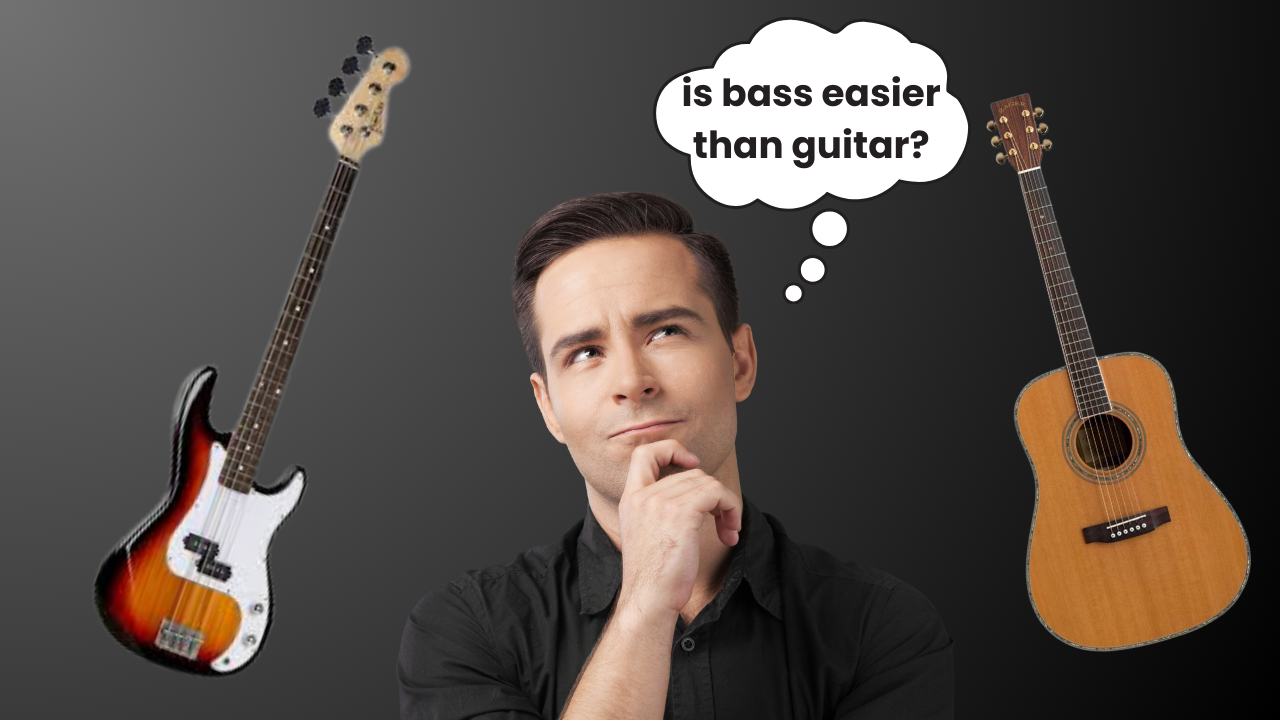Let’s lay our cards on the table: is bass guitar easier than guitar? Probably. At least when you’re starting out. But this really is a multi-faceted question so let’s get into the detail.
Picture the scenario if you will. Two individuals with no musical experience whatsoever stand facing each other. One has a six string electric guitar in his (or her) hands; the other has a four string electric bass. From a standing start, who’s going to fly out of the blocks first?
Well, stripping things back to bare fundamentals, and this will be contentious, the bass player should get up and running first. Why? Because at its simplest, you can play bass by simply strumming root notes, four to the bar. Indeed with some bass players (and styles) this is about as technical as it gets – because that may be all that’s required.
For six stringers though, it won’t be too long before you want to start playing chords, and that’s when things can get a little challenging. But the question ‘is bass easier than guitar’ is a little pointless because it really doesn’t matter. Both can be as simple or as technical as you like.
I’m glad we’ve got that over with because this really isn’t a practical question as the rest of this article will attempt to explain.
Let’s get real
Let’s be honest, we honestly doubt that anyone seriously gets out of bed one morning and says: ‘I’m going to start playing guitar or bass today. I wonder which one is easier?”
No, the more likely scenario is that you’ll have a pretty good idea where your allegiances lie – and you won’t choose one or the other simply because it’s ‘easier’.
If you’re more into rhythms then you may have a hankering for bass. Alternatively, if melodies are your thing, or you just fancy strumming chords to your favorite songs, then guitar might be in pole position on the starting grid.
Also there may be a guitar or bass hero that you want to emulate. On bass, I was inspired (and still am) by The Stranglers’ Jean Jacques Burnel. He WAS the reason I wanted to start playing bass guitar.
For you it might be Steve Vai, James Hetfield, Brian May, Mark Knopfler, Tommy Emmanuel, Lemmy, Mark King, Chet Atkins, Neil Young, James Jamerson, Alex Lifeson or Flea (delete as applicable). We all have our role models!
For me, I started on guitar, then went over to bass and then sort of settled somewhere in between. These days, I record music at home so I play both – but I’ve played both bass and guitar in bands that I’ve been in over the years.
In one particular band, I was originally the guitarist, but then the bass player left, so I switched roles and we got another guitarist. The same scenario may happen to you. I would say if you play guitar and then switch to bass, you’ll be up and running relatively quickly because you’ll know your way around the fretboard.
The other way around doesn’t really work. If you’re a bassist, it’s probably quite likely you won’t know any guitar chords. These are all general comments of course and there will be exceptions.
Now, let’s get physical
What you intend to do with your instrument is an important factor here because almost without exception, bass guitars are heavier and bigger than electric or acoustic guitars. Not only that but the fret spacing is wider too – another primary consideration if you have small hands.
So if you’re 4’ 6” and weigh 110lbs soaking wet, you may find a bass guitar simply too much to handle. My Fender Jazz four-string bass weighs 9lb and is 46” from the end of the body to the tip of the headstock. It’s a bit of a beast, especially if you’re standing on stage with it slung around your neck for four hours.
Comparatively, my Yamaha Pacifica 612 solid body electric six-string guitar weighs 8lbs and has an overall length of 38”. And just to add further comparison, my Yamaha CP700 electric acoustic six string guitar weighs only 5lbs with a 41” overall length.
If you’re a bedroom strummer, sitting down mainly, this will matter less, but your own physical stature, strength and size of your hands is something you should think about. Of course, this isn’t cast in stone: short scale basses are a perfect alternative for bass players who aren’t built like a Greek God (or Goddess).
And even full-size basses vary in size so if you’re hellbent on taking up bass, shop around and try some for size. Fenders tend to be quite big; brands like Ibanez and Yamaha have a number of smaller instruments in their respective portfolios.
Just for the record, the size of a guitar or bass is usually dictated by its scale length (diagram) and the best way to establish that is to measure the distance between the 12th fret and the nut and multiply it by 2. See diagram below.
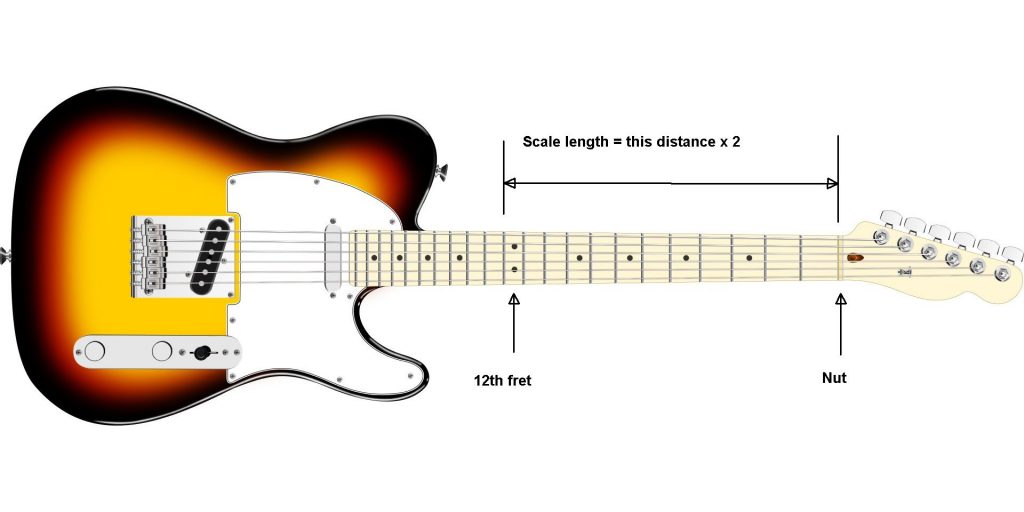
Starting out
Many musicians, at the start of their musical journeys, just want to learn a few songs so they can play along.
Depending on what genre of music floats your boat, this will present a number of options. Literally thousands of songs can be played on a relatively inexpensive acoustic guitar so this represents a good starting point.
The main advantages here are: you won’t need an amplifier so costs will be modest; acoustics are portable so they’re easy to transport around; and by learning just a few chords you’ll literally be able to play hundreds (if not thousands) of songs.
If electric guitar’s your thing, you’ll need to buy an amplifier but this doesn’t necessarily mean breaking the bank. We’re not talking Marshall stacks here or Mesa Boogie combos costing more than a grand – but for not much money you can buy a decent practice amp, or, if you’re a little more flush, something that will be powerful enough for band rehearsals as well.
Take a look at our article on guitar practise amps. Probably not powerful enough for gigging or rehearsals but great for budding bedroom strummers.
Need something a bit beefier? With 50W of power, 5 unique amp voicings plus more effects than you can shake a stick at, the Boss Katana KTN-50-2 guitar combo is a great performer at a great price.
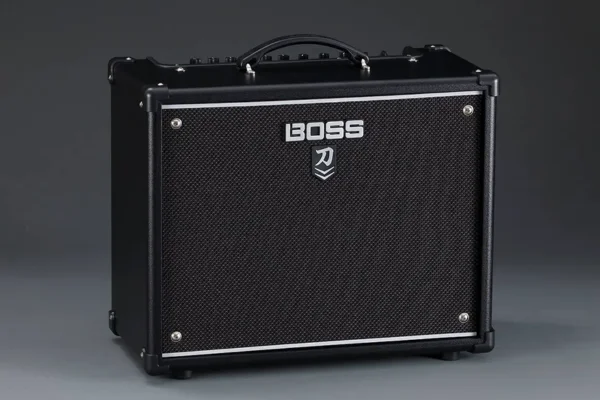
If you fancy yourself as a budding bassist, you could buy an acoustic bass and negate the need for a bass amp, but generally we’d recommend going electric so that means an amp will be needed.
With legendary branding behind it, the Fender Rumble 25 bass combo is great for practicing but also powerful enough for small gigs.
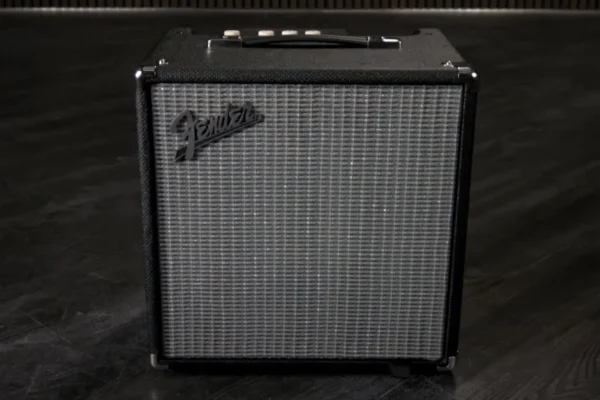
Different strokes
We haven’t yet talked about the roles of guitar and bass in the bigger picture. Let’s put the record straight. This also dovetails into the wider ‘is bass easier than guitar’ discussion.
It’s probably safe to say that bass players are more turned on by rhythm more than melody. You’ll often hear bands described as having tight rhythm sections and what that really means is that the drummer and bassist are locked in together, providing a really solid foundation for everything else to build on.
More specifically, the bassist will follow the drummer’s kick drum. It goes without saying therefore that for any bass player, developing a good sense of rhythm is a no brainer. Bass players are often closet drummers in disguise – they’re metronomic beasts that hold it all together. Sonic glue.
If you’ve got no natural rhythm you might struggle a bit here.
On guitar there are two basic flavors – rhythm and lead – or if you’re the sole axe wielder you’ll have to do both.
Rhythm guitar is simpler generally, certainly when you’re starting out. If you learn half a dozen major and minor chords and E and A shape barre chords, you’re good to go in many cases. Lead guitar will require some knowledge of scales (like the minor pentatonic) so the learning curve is a little steeper.
Styles and genres play an important role here. At its simplest, bass can be, well, simple! In a punk combo where it’s all about attitude, speed and aggression, chances are the bass player and the guitarist will be bashing out root notes and power chords at 900 mph!
There may only be three chords in the whole song. Often, simple is best. But alternatively, playing a style like jazz certainly isn’t easy. Chord structures are more complex and often require at least 15 fingers to play!
Put another way: is Joe Satriani a better player than Billie Joe Armstrong? Well yes technically but Billie Joe’s style suits Green Day perfectly. Without disrespecting the latter at all, you could probably learn ‘Basket Case’ much quicker than you could master ‘Surfing with the Alien’. Yet they’re both excellent songs – and both played fantastically well by the individuals concerned.
Same with bass. Victor Wooten versus Mark Hopper? Both legendary bassists playing wildly different styles – but both are perfect for the roles they fulfill. By definition though, Mark’s basslines will be significantly easier than Victor’s. Actually, most mere mortals will probably never be able to nail a Victor Wooten bassline!
While we’re on the subject of styles, both bass and guitar have options. On guitar you can use a pick, fingerpicking or a combination of both. On bass, arguably the most common method is using the fingers but it’s a close race.
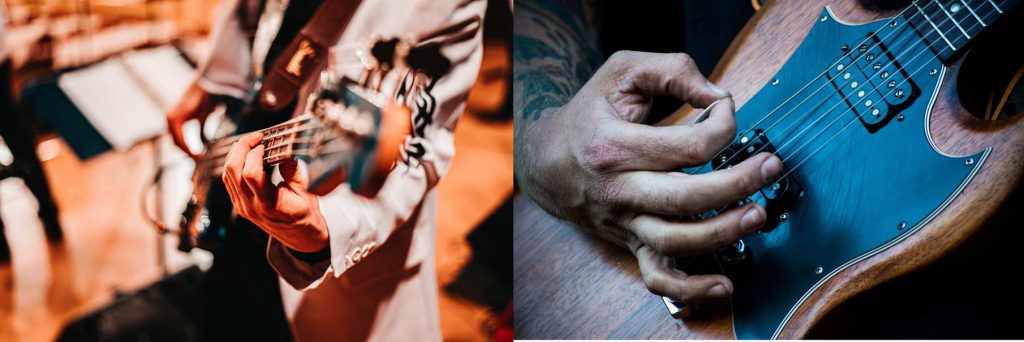
Finger playing tends to produce a warmer, more rounded sound whereas using a pick is generally more dynamic, aggressive and percussive. And let’s not forget slap bass, pioneered by such bass legends as Larry Graham, Les Claypool and Mark King of Level 42.
The Fun factor
Arguably, for solo strummers, six-string guitars afford a degree of flexibility that is difficult to replicate on bass. Guitar is supremely versatile – you can play four to the floor rock chord rhythms, funk, reggae, jazz and everything in between.
On electric you can play clean, overdriven or downright distorted; you can play widdly widdly lead lines, soulful blues or funky licks. As a solo instrument per se, it’s probably more enjoyable simply because you can learn songs easily. There’s no shortage of songbooks and material to strum along to.
When you’re just starting out, above everything else, it’s important that you have fun – and guitar gives you more options.
I’m not saying for a minute that bass isn’t enjoyable – I reach for my bass every day – but as a solo thing, guitar is more likely to give you that instant gratification.
Quality at the right price
Irrespective of whether bass is easier to learn than guitar, there are a few ground rules that need to be observed across both instruments.
Firstly, buy the best you can afford. When I started playing electric guitar about 300 years ago, my first instrument was a Jedson Telecaster copy. It cost $30 in 1978.
It was an absolutely horrendous instrument to play. The tuners were rusty and the only way to tune the thing was with a pair of pliers to crank the machine heads. The action (the distance between the fretboard and the strings) was so high that you could fit a pencil under it and the neck was warped like a banana.
Nowadays, things are better. You can buy really good quality instruments for not much money. Just look at this Yamaha Pacifica six string electric for just over $200 or this Ibanez 4 string bass for less than $200. These are big brands and high quality instruments. You really can’t go wrong.
The importance of this can’t be understated. If you find playing your instrument excessively difficult, or it won’t stay in tune, you’re just not going to enjoy it.
The main thing to take from this is to have fun! Learning guitar or bass is hard enough from scratch and the last thing you need is to have to wrestle with your instrument every time you play it. Set a budget and buy the best you can afford.
And if you can stretch to it – bass or guitar – get it set up by a professional luthier. Money well spent.
Conclusion
So to summarize, is bass easier than guitar, and perhaps fundamentally, is bass easier to learn than guitar?
Well, on a very simplistic level, we would say that providing the sheer size of a bass guitar isn’t too intimidating, it is easier to get up and running from a standing start. But as you progress technically, things get blurred because both are as easy, or hard as you want them to be.
But, realistically, if you really can’t make up your mind, we would say, start with guitar because it’s more flexible. The skills you learn on guitar will be at least partially transferable to bass and you could always switch later. I’ve no regrets about being able to play both. In a band environment, empathy for both instruments is really useful.
But is it easier to play bass than guitar? Well, probably – less strings and no chords. Remember though that both will require mastering the basic building blocks of left/right hand coordination and rhythm, plus technique and scales. There’s a massive crossover here. Timing is an essential ingredient with both so buy a metronome, it’ll be hugely useful for both.
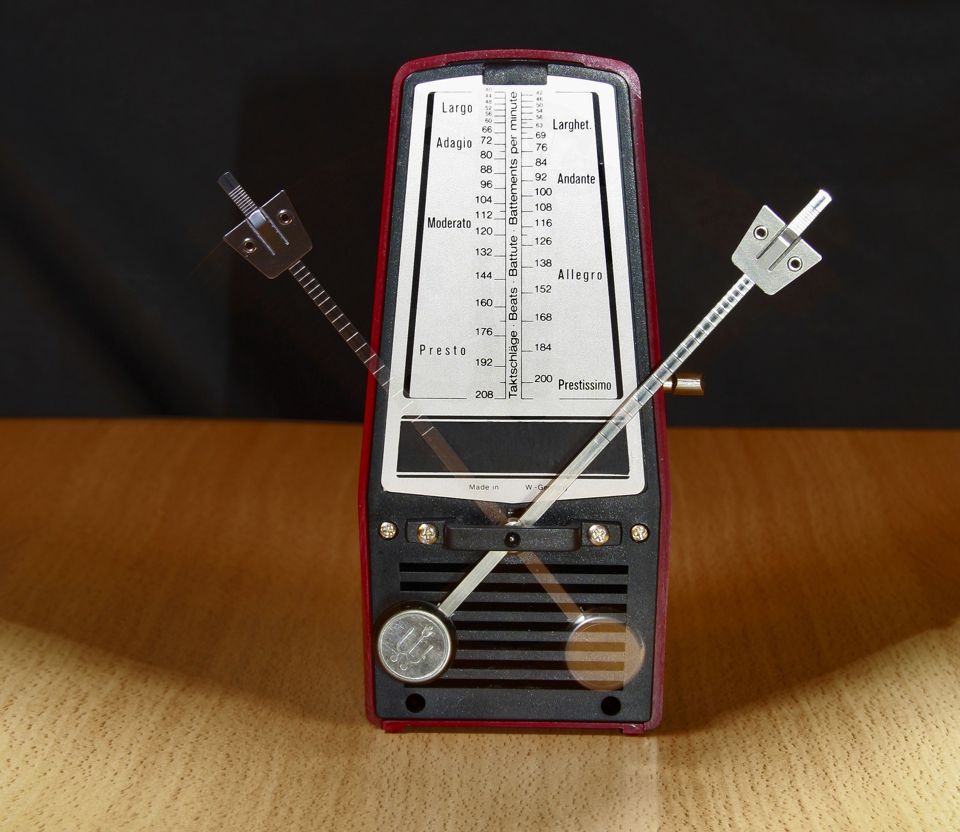
Construction wise, both are made from similar materials and feature common components like frets, necks, bridges, nuts, pickups (on electrics), strings, controls and tuners. The major difference (there are exceptions) is the number of strings. Six on a guitar; four on a bass.
In the same vein, it’s important to note therefore that the first four strings (E,A,D,G) on a six string guitar are the same as the strings on a four string bass. The bass is tuned an octave lower, but all the frets are the same notes. For reference, the 2nd fret on the D string of a four string bass (E), is the same as the low E string on a guitar.
On the subject of strings – bass strings are more expensive than their six string counterparts – but they break less so it kind of evens out.
Indeed, back in the day, before digital guitar tuners were even thought of, this was how bass players and guitarists tuned up with each other.
Whatever path you choose – bass, guitar, drums, vocals, keys, brass – it’s a journey that for most of us will take an entire lifetime. Enjoy the ride!

